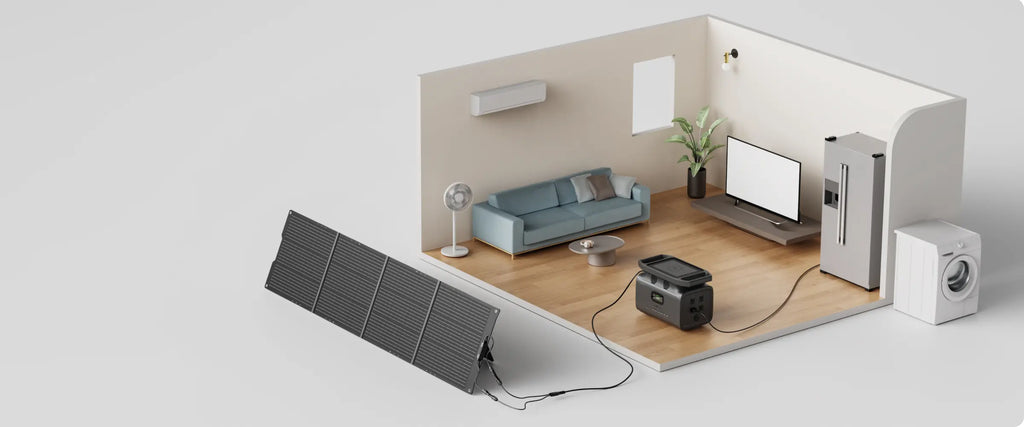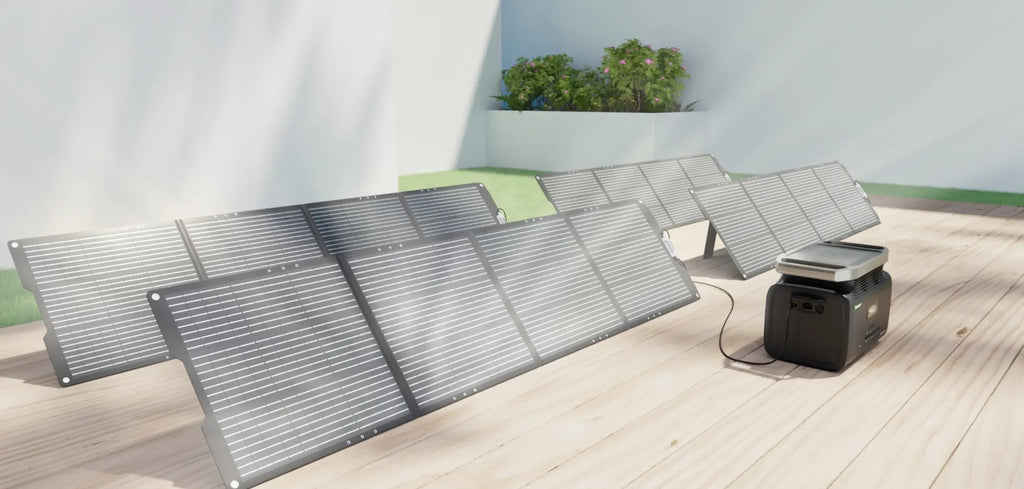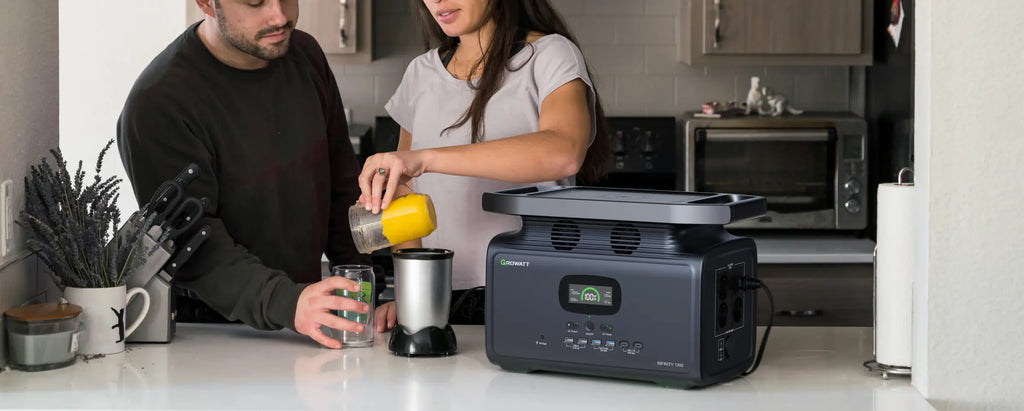Power outages and electrical blackouts are experiences that can quickly take the comfort out of any home. With electricity gone, it becomes impossible to charge your phones, power your appliances, and carry out other essentials- unless you have a backup plan like a solar generator, that is.


Solar generators are rapidly becoming the most sought-after alternative for electrical supply. Without the noise and combustion pollution typical of regular fuel generators, solar generators offer a clean and eco-friendly backup electricity option suitable for use in residential areas. However, while the benefits of solar generators for powering houses are undeniable, how do you know what size of generator is optimal for your home? What Size Solar Generator to Run Your Whole House?
Solar generators come in various sizes, and knowing which size you should buy is integral for efficiently powering your home during a power outage. In this guide curated just for you, we offer insight into everything you need to know about choosing the right solar generator size for your home.

What Is A Solar Generator for a House?
Choosing the right size of solar generator for your house begins with understanding what a solar generator is and how it works.
A solar generator is a portable power station that uses solar panels to capture and store the sun’s energy in a battery. Using these panels, a solar generator transforms energy from sunlight to stored direct current (DC) in a battery, which is then used to charge or operate electrical appliances. However, this DC cannot directly power the devices inside a home.
To remedy this, another essential within the solar generator known as a solar inverter transforms the DC to alternating current (AC). The AC energy can then be used to power necessary appliances.
For homes, a solar generator serves as a stand-by solution for keeping the building powered during a power outage. Power outages are becoming more frequent and show no sign of slowing. In the U.S. alone, the average annual number of power outages due to weather problems increased by an estimated 78% between 2011 and 2021.
With a worrying increase in the frequency of blackouts, often due to weather-related events, it is essential to find a sustainable solution for accessing power during an outage. Although there are several other options, such as fuel-based generators, none are as sustainable and eco-friendly for homes as solar generators are.
|
Appliance |
Power Consumption (Watts) |
|
Air Conditioner (Room) |
1000 |
|
Air Conditioner (Central) |
2000-5000 |
|
Ceiling Fan |
65-175 |
|
Clothes Dryer (Electric) |
3000 |
|
Clothes Dryer (Gas) |
1800 |
|
Clothes Washer |
350-500 |
|
Coffee Maker |
900-1200 |
|
Deep Freezer |
500 |
|
Desktop Computer |
100-450 |
|
Dishwasher |
1200-2400 |
|
Electric Blanket |
60-200 |
|
Electric Kettle |
1200 |
|
Electric Oven |
2150 |
|
Electric Stove (8" Element) |
2100 |
|
Flat Screen Television |
120 |
|
Furnace Fans |
750 |
|
Hair Dryer |
1200-1875 |
|
Heater (Portable) |
750-1500 |
|
Iron |
1000-1800 |
|
Laptop |
50 |
|
Microwave Oven |
750-1100 |
|
Refrigerator / Freezer |
700 |
|
Toaster |
850 |
Can A Solar Generator Power A House?
The short answer is ‘yes.’ Yes, a solar generator can power a house. However, not all solar generators can produce enough power to power a home efficiently. As such, for a solar generator to control a place, it needs to have the correct battery capacity and energy to do so.
When choosing a solar generator to power your house, you must consider several factors. These factors include the average power consumption of your home, geographical location, and expected usage due to the power outage frequency.
Unlike smaller solar generators designed for outdoor activities like camping trips, solar generators designed to be home backup systems must provide enough power to keep a home running. Without enough power output suitable for your home’s power needs, a solar generator might be unable to power all appliances, may not work at all, or may pose a risk or danger to you during use.
Hence, you must ensure you pick a generator with enough battery capacity to power your home for as long as necessary and a sufficient inverter power output to generate enough power for your home. To do this, you first need to determine how much energy your home uses and then purchase a generator with a size large enough to accommodate your energy needs.
Additionally, it would be best to establish how much energy supply your generator must provide. If your home constantly suffers from power outages or blackouts, it is best to choose a generator that will frequently keep your home running. Essentially, you not only need to invest in a solar generator that produces enough energy for all your home appliances but also one that will provide electricity as frequently as necessary without failure.
You must also consider your location when choosing solar generators as a home system backup. Solar generators are wholly dependent on energy from the sun. As a result, they require areas that get an adequate amount of sunlight with less cloud coverage to interfere with the amount of the sun reaching the photovoltaic solar panels. However, solar panels still capture power even on overcast days.
Considering these factors will help you determine if a solar generator is your best option. While consistent power is a significant demand, it isn’t entirely unachievable with the right size of solar generator. If you do not suffer from frequent power outages and only plan to get a backup for emergencies, it won’t be challenging to find a solar system built to provide your substantial power demands and keep your necessary devices running.
Regardless, solar generators are a great way to supplement regular electricity. Unlike traditional fuel-based generators, they do not utilize fossil fuels and therefore do not contribute to the depletion of natural resources. More importantly, solar generators are eco-friendly as they do not emit toxic waste gas or compromise the pristine state of natural ecosystems.
This not only makes them a cleaner and safer power supply option for the environment, but the lack of noise and air pollution means solar generators can easily be used in residential areas.

What Size Solar Generator Do You Need to Run A House?
Generally speaking, to run an average house you need at least a 2000W-3000W solar generator, but there are other factors to consider. Solar generators come in various sizes, and each size has varying capacity levels. It is no rocket science that the larger the generator, the larger its capacity and the more power it will produce. Figuring out the right size of solar generator for your home depends on the average energy your household consumes. This, in turn, depends on the appliances you need, the solar generator to power.
Two things you need to do to determine the right solar generator size for your home include:
1. Calculate Your Average Daily Electricity Consumption(Watt-hours)
Understanding your daily energy consumption is crucial for managing your household's electricity needs. This metric, expressed in watt-hours (Wh), is derived by multiplying the wattage of each appliance by its average daily usage time.
Using Utility Bills for Accurate Assessment
One of the most straightforward methods to gauge your daily energy consumption is to consult your past electricity bills. These statements contain all your energy expenses, from appliances and lighting to heating and cooling systems.
To calculate, subtract the energy usage of two consecutive months (in watt-hours) and divide by the number of days in that period.
Manual Calculation for More Control
If you don't have access to past bills, you can still manually estimate your daily energy consumption:
- Identify Daily Device Wattage: Determine the wattage each of your appliances consumes daily.
- Convert to Kilowatts:Since 1 kilowatt (kW) equals 1,000 watts, convert your daily consumption from watts to kilowatts. For example, 1,000 watts would be 1 kW.
- Monthly Appliance Kilowatt Usage:Calculate how many kilowatts each appliance uses in a month.
- Calculate Daily Cost: Multiply the monthly kilowatt figure by your electricity rate to find out your daily energy expenditure.
2. Calculate Your Wattage Requirements(Watts)
The next step in your solar generator journey is to figure out the total wattage required to power all your appliances. This is crucial for selecting a generator that meets your energy needs.
Locate Appliance Wattage Information
Most appliances come with labels that specify their wattage requirements. These labels are usually found on the back or bottom of the device. If the label is missing or unreadable, you can refer to the manufacturer's manual for this information.
Online Resources and Manufacturer Contact
If you've misplaced the manual and still can't find the wattage, you can search online using the device's model number. Many manufacturers provide this information on their websites. As a last resort, you can directly reach out to the manufacturer for the wattage details.
Compile and Sum Up Wattage
Once you've gathered the wattage information for all your appliances, create a table to sum it up. The total will represent your overall wattage needs. For context, the average American household consumes approximately 886 kWh per month.
By understanding your wattage requirements, you can make an informed decision when choosing a solar generator. This is particularly important as the typical American household uses around 30 kilowatt-hours (kWh) per day. Therefore, having a clear picture of your energy needs will help you select a solar generator that can adequately power your home.
How to Choose the Best Solar Generator for Your House
A solar generator is a huge investment which is why it is essential to ensure you are making the right choice. Some things you need to keep in mind when choosing a solar generator for your home include:
1. Battery Type
Solar generators come with different battery types, and each type plays a crucial role in determining the generator’s performance. The four most common types of batteries typically found in solar generators are lead-acid, lithium-ion, flow batteries, and nickel-cadmium. Of the four, lithium-ion and lead-acid batteries are the most popular.
Lead-acid batteries are popularly chosen because they are cheap, reliable, and easily recycled. More importantly, they are a technology that has been around for years and is typically used to power vehicles. However, they have a short lifespan and do not last long as they need to be charged frequently.
On the other hand, lithium-ion batteries are a newer technology. They do not require as much maintenance, and they have a higher battery density that causes them to hold more energy. Additionally, they do not need to be recharged as often as lead-acid batteries.
While this is great, lithium-ion batteries are typically more expensive, meaning solar generators with this battery option will be more pricey.
Nickel-cadmium (Ni-Cd) and flow batteries may have been around longer but are less widespread. Ni-Cd batteries are durable, especially at extreme temperatures, but are toxic. Flow batteries, on the other hand, may be newly emerging but have proven to have the most extended lifespan of all four. However, they tend to be bulkier and extremely expensive.
2. Charging Speed
The best type of solar generators is those with batteries that recharge quickly. A fast-charging solar generator ensures you can quickly replenish its energy reserves, thereby providing a continuous power supply. More importantly, a solar generator with shorter charging cycles means your generator spends less time in the charging phase, ensuring you can use it more frequently. With a solar generator that offers fast charging and shorter charging time, you confirm you always have a power supply reserve ready to use in times of emergency.
3. Expandability
When choosing a solar generator, you need one to scale up when necessary. After all, you cannot always have uniform energy needs, and your energy consumption will not always be constant. In the future, you may purchase new appliances that must be powered during a power outage.
As a result, it is essential to choose a solar generator with expandable battery packs to accommodate your future energy needs.
It is important to note that not all solar generators are expandable, and not all expandable solar generators are the same. The extent of expandability typically varies between models and brands.
4. APP-Supported
New-age solar generators have an innovative solution that enables them to be controlled using a mobile application. This offers users greater control over their solar generators, providing monitoring, remote control, and additional exciting features that improve user experience. With app-controlled solar generators, you can control your solar generator at any time and from any location using your smartphone.
Growatt INFINITY 1500 Solar Generator for Home

When offering an uninterrupted power supply, only a few solar generators perform as efficiently as the Growatt INFINITY 1500 Solar Generator.
Available in two options (100W and 200W portable solar panels), this solar generator has a 2000W output power that’s suitable for powering a wide range of home appliances. With a fast charging speed, up to 12 diverse outlets to charge your devices, and an impressive battery capacity, Growatt INFINITY 1500 solar generator is a reliable solution for keeping you powered through power outages.
Although the INFINITY 1500 has sophisticated features, it tops it all with app control. With the ability to control your Growatt INFINITY 1500 anywhere and at any time, you can optimize electrical backup and unlock a new threshold of uninterrupted power supply.
FAQs of Solar Generators for Home
1. How much does a solar generator for a house cost?
The cost of a solar generator varies with size, manufacturer, model, capacity, type, and even location.
2. Can a solar generator power an AC unit?
Yes, a solar generator can power an air conditioning unit. However, you must consider other factors, such as the power your AC unit consumes and the solar generator’s capacity.
3. How long will a solar generator power a refrigerator?
This depends on the solar generator's capacity, the refrigerator’s wattage, and energy efficiency. For example, a solar generator with a 1000Wh battery capacity will power a 100-watt refrigerator for up to 10 hours.
Final Thoughts
Solar generators are an excellent option for powering your appliances during power outages. However, choosing the right one can be a hassle because they come in various sizes and capacities.
Choosing the right size solar generator to power your house requires considering your energy needs and other factors like the generator's capacity, expandability, charging speed, and better type. By carefully assessing these factors, you can decide on the appropriate size solar generator to run your whole house.






